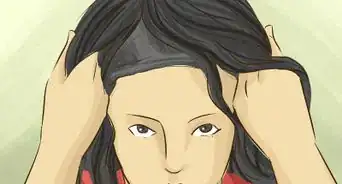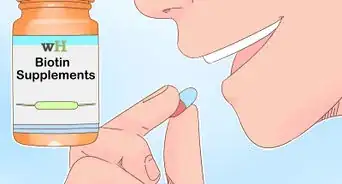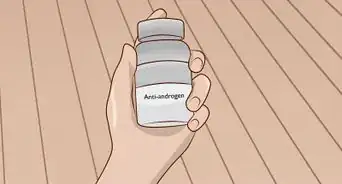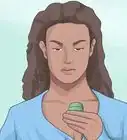This article was co-authored by Courtney Foster. Courtney Foster is a Licensed Cosmetologist, Certified Hair Loss Practitioner, and Cosmetology Educator based out of New York City. Courtney runs Courtney Foster Beauty, LLC and her work has been featured on The Wendy Williams Show, Good Morning America, The Today Show, The Late Show with David Letterman, and in East/West Magazine. She received her Cosmetology License from the State of New York after training at the Empire Beauty School - Manhattan.
There are 15 references cited in this article, which can be found at the bottom of the page.
This article has been viewed 237,439 times.
Accutane is a brand name for the prescription medication isotretinoin, which is also available under a variety of generic names. The drug is a synthesized form of Vitamin A, and it treats severe acne by inhibiting the body's production of sebum, or oil. Accutane can cause a wide array of side effects, including dry skin, eye irritation and nosebleeds, in addition to hair loss. If you do experience hair loss while taking Accutane, it will probably stop shortly after you stop taking the drug, although the texture of your hair may be permanently changed.[1] Unfortunately, there's nothing you can do to entirely prevent hair loss while you are taking this medication, but taking good care of your body and of your hair might help.
Steps
Maintaining Your Body's Natural Balance
-
1Take the lowest effective dose. The more Vitamin A you have in your body from Accutane, the more likely you are to suffer from adverse side effects, including hair loss. Ask your doctor what the lowest dose is that would be effective for treating your condition.[2]
-
2Talk to your doctor about vitamin supplements. Accutane may cause vitamin deficiencies in some patients, so it may be a good idea to have some blood work done. Your symptoms may also be caused by the extremely high doses of Vitamin A your body is getting from Accutane.
- Accutane can also cause a deficiency of B vitamins, specifically folic acid, in some individuals.[3] . If you are found to have a deficiency, taking B vitamin supplements may help your hair grow faster and become stronger. You can also try eating foods that are rich in folic acid, such as broccoli, asparagus, green peas, avocados, bananas, papayas, white rice, and beef liver.[4]
- Healthy levels of vitamins C and E, zinc, calcium, magnesium, selenium, and Omega-3 fatty acids are also needed to help prevent hair loss and thinning. Consider taking multivitamins and other supplements that contain these ingredients.
- If you take multivitamins, check to make sure they do not contain Vitamin A. If they do, try switching to a different multivitamin in order to reduce symptoms that may be caused by an excess amount of the vitamin in your body.[5]
Advertisement -
3Combat hormone imbalances while taking Accutane. Accutane is thought to suppress the levels of certain pituitary hormones, although its exact effects on the body's hormones are not well understood. Talk to your doctor about prescription medications and lifestyle changes that can help you maintain balanced hormones.[6]
-
4Reduce stress to prevent hair loss.[9] Stress can cause hair loss, and combined with the effects of Accutane, may worsen your symptoms. If you are very stressed, activities such as yoga, meditation, or even therapy might benefit you.
-
5Embrace a healthy lifestyle. Make sure you eat a healthy diet, rich in lean proteins, antioxidant rich fruits and vegetables, and healthy oils.[10] Getting the proper nutrition will help keep your hair as healthy as possible.[11] Proper hydration and regular exercise may also help you combat your hair loss.
Caring for Your Hair
-
1Moisturize. Accutane can cause your skin and hair to become extremely dry, and this can lead to hair that is brittle and breaks easily. In order to combat this, make sure to moisturize your hair and scalp regularly.[12]
- Leave-in conditioners are great for adding moisture to dry hair. Try wrapping your hair in a warm towel to help the product soak in better.[13]
- Look for conditioners and other hair care products that contain nourishing oils, like argan oil, avocado oil, or olive oil.[14]
- You can also add moisture with hair masks made from everyday ingredients that you probably have in your kitchen right now. Egg yolks, honey, coconut oil, and olive oil are all great for treating dry hair.[15]
-
2Use the right shampoo. Be cautious of harsh ingredients in shampoos, like alkaline and alcohol, that might strip too much moisture from your hair.[16] [17]
- Your hair may be much less oily while you are taking Accutane than it previously was, which may mean that you don't need to shampoo your hair as often. Shampooing your hair too often can worsen the dryness, so only shampoo it as often as necessary to keep it looking clean.
- While many alcohols are bad for dry hair, Cetearyl alcohol, Cetyl alcohol, and Stearyl alcohol will actually help it retain moisture.[18]
- Look for a shampoo that will help lower the Ph of your hair, as this will also help it retain moisture.[19]
- Fragrance-free shampoos are a good choice for dry hair.[20]
- Sulfates are not necessarily bad for your hair, but they are known to strip the oil from your hair. If your hair is excessively dry while you are taking Accutane, you may want to look for sulfate-free options.[21]
-
3Avoid processing your hair. Chemical processes like hair dyes, perms, and bleaches cause the hair to become dry and brittle, as does excessive heat. This can worsen the hair loss you are experiencing while taking Accutane, so steer clear of these treatments while you are taking the medication.
-
4Avoid brushing hair when it's wet. Brushing wet hair can cause it to break and split the ends, which makes it more brittle. Try gently running your fingers through your hair to detangle it while it is wet, and waiting to brush it until it is dry. If necessary, use a detangling product.[22]
-
5Protect your hair from the sun. Sun exposure can also worsen your dry hair, so you may want to try staying out of the sun while you are taking Accutane. If that's not possible, take care to protect your strands when you are outside on sunny days by wearing a hat or a scarf on your head.[23]
Warnings
- Accutane has been known to cause a wide array of side effects, many of which are much more serious than hair loss. These include depression, liver problems, changes to your vision, and many others.⧼thumbs_response⧽
- Consistently use reliable contraception while taking Accutane. It is dangerous to become pregnant while taking the drug because it has been linked to birth defects.[24]⧼thumbs_response⧽
- Never take Accutane without a prescription. It is very important for you to be under the care of a doctor while taking this medication.⧼thumbs_response⧽
References
- ↑ http://www.mayoclinic.org/drugs-supplements/isotretinoin-oral-route/side-effects/drg-20068178,
- ↑ http://www.facingacne.com/accutane-necessarily/
- ↑ http://www.ncbi.nlm.nih.gov/pmc/articles/PMC4248518/
- ↑ http://www.medicinenet.com/vitamins_and_calcium_supplements/page4.htm
- ↑ https://www.nlm.nih.gov/medlineplus/ency/article/000350.htm
- ↑ http://www.ncbi.nlm.nih.gov/pubmed/21103844
- ↑ https://www.mayoclinic.org/diseases-conditions/hypopituitarism/symptoms-causes/syc-20351645
- ↑ http://www.prevention.com/beauty/hormone-balancing-foods-better-skin
- ↑ Courtney Foster. Licensed Cosmetologist. Expert Interview. 9 December 2019.
- ↑ Courtney Foster. Licensed Cosmetologist. Expert Interview. 9 December 2019.
- ↑ https://www.webmd.com/skin-problems-and-treatments/hair-loss/men-hair-loss-17/eat-right-healthy-hair
- ↑ Courtney Foster. Licensed Cosmetologist. Expert Interview. 9 December 2019.
- ↑ http://naturalbeautytips.co/home-remedies-for-dry-brittle-hair/
- ↑ http://www.webmd.com/beauty/hair-repair/ingredients-dry-hair
- ↑ http://www.womansday.com/style/beauty/advice/a1853/8-homemade-hair-treatments-110251/
- ↑ Courtney Foster. Licensed Cosmetologist. Expert Interview. 9 December 2019.
- ↑ http://naturalbeautytips.co/home-remedies-for-dry-brittle-hair/
- ↑ http://www.webmd.com/beauty/hair-repair/ingredients-dry-hair
- ↑ http://www.webmd.com/beauty/hair-repair/ingredients-dry-hair
- ↑ http://www.webmd.com/beauty/hair-repair/ingredients-dry-hair
- ↑ https://www.aad.org/media/news-releases/getting-past-the-hype-dermatologist-untangles-common-hair-care-misconceptions
- ↑ http://naturalbeautytips.co/home-remedies-for-dry-brittle-hair/
- ↑ http://naturalbeautytips.co/home-remedies-for-dry-brittle-hair/
- ↑ http://www.mayoclinic.org/drugs-supplements/isotretinoin-oral-route/precautions/drg-20068178
About This Article
To minimize hair loss while you’re taking Accutane, talk to your doctor about taking the lowest effective dose. It’s also important to review any other supplements you’re taking and make sure you’re getting all the nutrients you need, since Accutane can cause deficiencies that might lead to hair loss. Additionally, work with your doctor to make sure you’re not getting extra vitamin A from your current supplements. If your doctor is concerned that Accutane might be causing a hormone imbalance, ask them about prescriptions or lifestyle changes that can help. Keep reading for more advice from our Medical co-author, including how to care for your hair while you’re on Accutane.






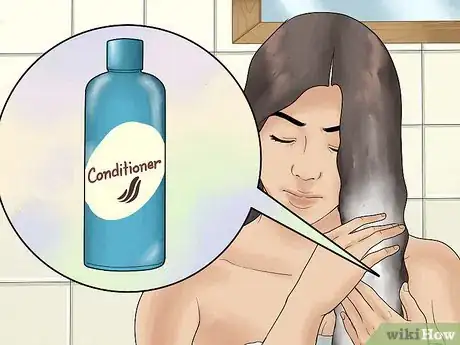

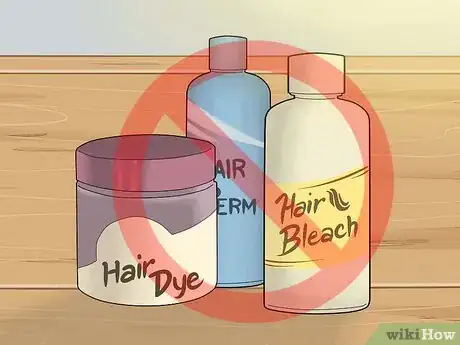
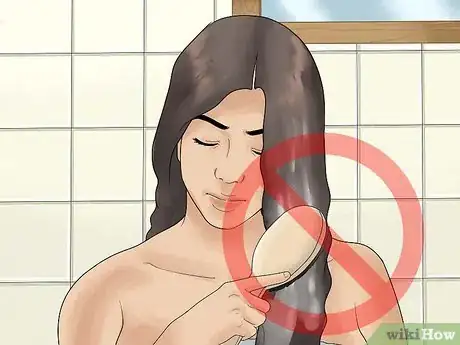





-Step-11.webp)



